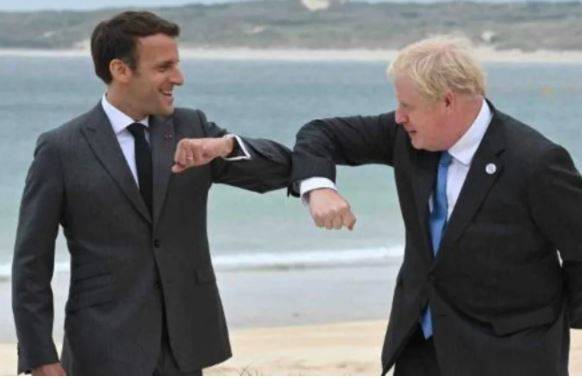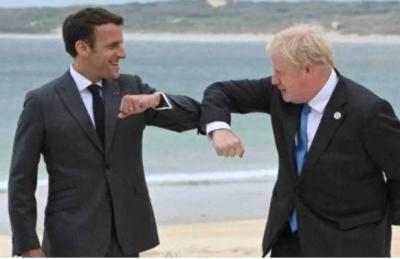On Friday, Britain sought to put the dispute with France over the submarine deal with Australia, which Paris deemed a "stab in the back," behind them. The anger in Paris followed Australia's abandonment of a massive deal to purchase diesel submarines from France in favor of American nuclear-powered submarines, especially since the agreement had been reached through secret talks facilitated by Britain.
On Friday, British Prime Minister Boris Johnson spoke by phone with French President Emmanuel Macron following Paris's accusations that its allies London and Washington had "betrayed" it, describing London as Washington's "little partner." Johnson and Macron agreed to "continue working closely together... globally on our shared agenda, through NATO and bilaterally." They also referred to the "strategic importance" of British-French cooperation in the Indian and Pacific Oceans and in Africa. They also agreed to "intensify cooperation" against human traffickers across the English Channel and to remain in touch regarding fishing licenses after Britain's exit from the European Union and trade arrangements in Northern Ireland.
The submarine deal forms the cornerstone of a new strategic alliance involving Australia, Britain, and the United States known as "AUKUS," seen as an attempt to counter China's ambitions in the Indian and Pacific Oceans. However, France and others in NATO have remained outside this alliance, although the "AUKUS" trio emphasized that the pact is not intended to be exclusionary.
In a brief description of the call, Macron's office stated that the Prime Minister proposed "re-establishing cooperation" and that the French President "awaits his proposals." Macron was more flexible after a phone conversation on Wednesday with U.S. President Joe Biden. According to a joint statement, Macron and Biden pledged to hold a meeting at the end of October, ahead of the United Nations Climate Summit in Scotland. A statement from Downing Street indicated that Johnson "looks forward to welcoming President Macron to Glasgow in November for COP26," where both agreed on the need for stronger climate actions.
Regarding the French shock during a meeting of the European "E12" security group that includes Britain, French Armed Forces Minister Florence Parly considered the announcement of the "AUKUS" alliance to be a "shock." She told reporters in Stockholm, where the meeting took place, "We expect clarifications not only from a member of the E12 but also from a European country and ally."
French anger over the submarine deal prompted Macron to recall his ambassadors to Washington and Canberra in an unprecedented diplomatic protest. However, the French envoy in London did not leave, and French Secretary of State for European Affairs Clément Beaune described London as merely the "third wheel" in the deal.
This week, Johnson appealed to France with a mix of French and English words, saying, "Give me a chance," and called on Paris to calm down and "keep its composure." The submarine deal dispute has led to a deterioration in relations between Paris and London to their lowest level since the UK's 2016 referendum on leaving the European Union.
Britain's exit from the EU has sparked numerous disputes between the two countries, particularly regarding fishing rights and trade with Northern Ireland, which were highlighted during the G7 meeting in June. The flow of migrants has also been a significant source of tension, with British politicians accusing the French of failing to do what is necessary to stop migrant boats crossing the English Channel.
Experts believe there remains a desire on both sides to continue close cooperation on defense matters. Analysts Hans Kundani and Alice P. Gellard from Chatham House policy institute stated that the submarine deal "has sparked legitimate anger in France and clearly dealt a serious blow to trust and cooperation between France and the United Kingdom, in a relationship already strained by years of disputes following the UK's vote to leave the EU." They added that "the reality is that both countries share a similar set of interests in the Indian and Pacific Oceans and beyond, and they will need to find ways to overcome the current tensions."




